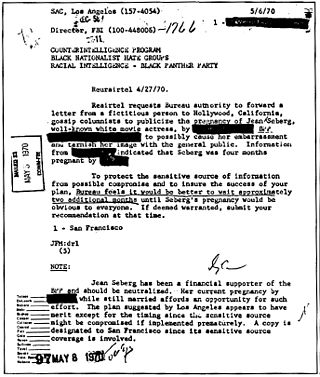
COINTELPRO was a series of covert and illegal projects actively conducted by the United States Federal Bureau of Investigation (FBI) aimed at surveilling, infiltrating, discrediting, and disrupting domestic American political organizations. FBI records show COINTELPRO resources targeted groups and individuals the FBI deemed subversive, including feminist organizations, the Communist Party USA, anti–Vietnam War organizers, activists of the civil rights and Black power movements, environmentalist and animal rights organizations, the American Indian Movement (AIM), Chicano and Mexican-American groups like the Brown Berets and the United Farm Workers, independence movements, a variety of organizations that were part of the broader New Left, and white supremacist groups such as the Ku Klux Klan and the far-right group National States' Rights Party.

John Edgar Hoover was an American law-enforcement administrator who served as the first Director of the Federal Bureau of Investigation (FBI). Calvin Coolidge appointed Hoover as director of the Bureau of Investigation, the predecessor to the FBI, in 1924. In June 1935, Hoover became instrumental in founding the FBI, where he remained director for 37 years until his death in May 1972. Hoover expanded the FBI into a larger crime-fighting agency and instituted a number of modernizations to policing technology, such as a centralized fingerprint file and forensic laboratories. Hoover also established and expanded a national blacklist, referred to as the FBI Index or Index List.

Martin Luther King Jr. was an American Baptist minister and activist who was one of the most prominent leaders in the American civil rights movement from 1955 until his assassination on April 4, 1968. A Black church leader and a son of early civil rights activist and minister Martin Luther King Sr., King advanced civil rights for people of color in the United States through nonviolence and civil disobedience. Inspired by his Christian beliefs and the nonviolent activism of Mahatma Gandhi, he led targeted, nonviolent resistance against Jim Crow laws and other forms of discrimination in the United States.

Martin Luther King Jr. Day is a federal holiday in the United States marking the birthday of Martin Luther King Jr. It is observed on the third Monday of January each year. Born in 1929, King's actual birthday is January 15. The holiday is similar to holidays set under the Uniform Monday Holiday Act. The earliest Monday for this holiday is January 15 and the latest is January 21.

Cynthia Ann McKinney is an American politician, academic, and conspiracy theorist. As a member of the Democratic Party, she served six terms in the United States House of Representatives. She was the first African American woman elected to represent Georgia in the House. She left the Democratic Party and ran in 2008 as the presidential nominee of the Green Party. She ran for vice president in 2020 after the Green Party of Alaska formally nominated her and draft-nominated Jesse Ventura for president. She is currently a professor in Political Science at North South University in Bangladesh.
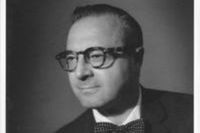
Stanley David Levison was an American businessman and lawyer who became a lifelong activist in progressive causes. He is best known as an advisor to and close friend of Martin Luther King Jr., for whom he helped write speeches, raise funds, and organize events.

William Cornelius Sullivan was an assistant director of the Federal Bureau of Investigation who was in charge of the agency's domestic intelligence operations from 1961 to 1971. Sullivan was forced out of the FBI at the end of September 1971 due to disagreements with FBI director J. Edgar Hoover. The following year, Sullivan was appointed as the head of the Justice Department's new Office of National Narcotics Intelligence, which he led from June 1972 to July 1973. Sullivan died in a hunting accident in 1977. His memoir of his thirty-year career in the FBI, written with journalist Bill Brown, was published posthumously by commercial publisher W. W. Norton & Company in 1979.
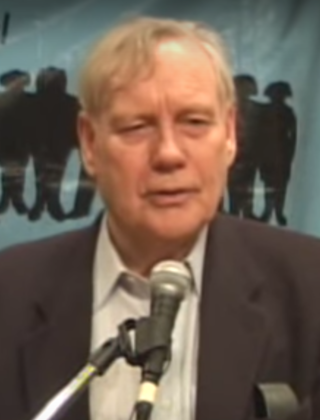
William Francis Pepper is a U.S. lawyer formerly based in New York City who is most noted for his efforts to prove government culpability and the innocence of James Earl Ray in the assassination of Martin Luther King, Jr. Pepper has also been trying to prove the innocence of Sirhan Sirhan in the assassination of Robert F. Kennedy. He is the author of several books, and he has been active in other government conspiracy cases, including the 9/11 Truth movement, and has advocated that George W. Bush be charged with war crimes.

Philip H. Melanson was a Chancellor Professor of Policy Studies at University of Massachusetts Dartmouth and served on the Executive Board of the university's Center for Policy Analysis (CFPA) now known as the Public Policy Center. He served as chair of the Political Science Department for 12 years.
David Jeffries Garrow is an American author and historian. He wrote the book Bearing the Cross: Martin Luther King, Jr., and the Southern Christian Leadership Conference (1986), which won the 1987 Pulitzer Prize for Biography. He also wrote Liberty and Sexuality (1994), a history of the legal struggles over abortion and reproductive rights in the U.S. prior to the 1973 Roe v. Wade decision, Rising Star: The Making of Barack Obama (2017), and other works.

"I Have a Dream" is a public speech that was delivered by American civil rights activist and Baptist minister Martin Luther King Jr. during the March on Washington for Jobs and Freedom on August 28, 1963. In the speech, King called for civil and economic rights and an end to racism in the United States. Delivered to over 250,000 civil rights supporters from the steps of the Lincoln Memorial in Washington, D.C., the speech was one of the most famous moments of the civil rights movement and among the most iconic speeches in American history.
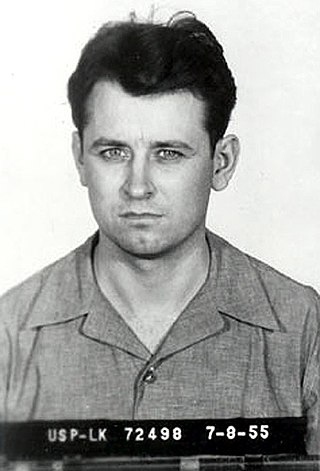
James Earl Ray was an American fugitive convicted for assassinating Martin Luther King Jr. at the Lorraine Motel in Memphis, Tennessee, on April 4, 1968. After this, Ray was on the run and was captured in the UK. Ray was convicted in 1969 after entering a guilty plea—thus forgoing a jury trial and the possibility of a death sentence—and was sentenced to 99 years of imprisonment.

Martin Luther King Jr., an African-American clergyman and civil rights leader, was fatally shot at the Lorraine Motel in Memphis, Tennessee, on April 4, 1968, at 6:01 p.m. CST. He was rushed to St. Joseph's Hospital, where he died at 7:05 p.m. He was a prominent leader of the civil rights movement and a Nobel Peace Prize laureate who was known for his use of nonviolence and civil disobedience.
Bernard Lee was an activist and member of the Southern Christian Leadership Conference during the Civil Rights Movement. He was a key associate of Martin Luther King Jr.

The origins of global surveillance can be traced back to the late 1940s, when the UKUSA Agreement was jointly enacted by the United Kingdom and the United States, whose close cooperation eventually culminated in the creation of the global surveillance network, code-named "ECHELON", in 1971.
The history of the 1954 to 1968 American civil rights movement has been depicted and documented in film, song, theater, television, and the visual arts. These presentations add to and maintain cultural awareness and understanding of the goals, tactics, and accomplishments of the people who organized and participated in this nonviolent movement.

The FBI–King suicide letter or blackmail package was an anonymous 1964 letter and package by the Federal Bureau of Investigation (FBI) meant to blackmail Martin Luther King Jr. The suicide letter was part of the FBI's COINTELPRO operation against King.

A bronze bust of Martin Luther King Jr. was made by African-American artist Charles Alston in 1970, two years after King was assassinated. Alston received a commission from the Reverend Donald S. Harrington, of the Community Church of New York, to create a bust of King for $5,000. Five bronze busts were cast in 1970, each approximately 32 centimetres (13 in) high.

Conspiracy theories about the assassination of Martin Luther King Jr., a prominent leader of the civil rights movement, relate to different accounts of the incident that took place on April 4, 1968, in Memphis, Tennessee. King was assassinated on the balcony of the Lorraine Motel, the day after giving his final speech "I've Been to the Mountaintop". Claims soon arose over suspect aspects of King's assassination and the controversial role of the alleged assassin, James Earl Ray. Although his guilty plea eliminated the possibility of a trial before a jury, within days, Ray had recanted and claimed his confession was forced. Suspicions were further raised by the confirmation of illegal surveillance of King by the FBI and the CIA.
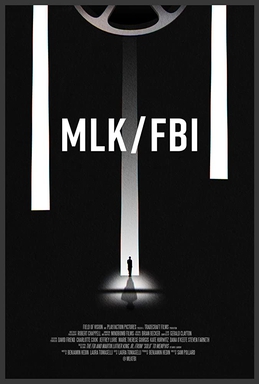
MLK/FBI is a 2020 American documentary film directed by Sam Pollard, from a screenplay by Benjamin Hedin and Laura Tomaselli. It follows Martin Luther King Jr. as he is investigated and harassed by J. Edgar Hoover's Federal Bureau of Investigation.

















